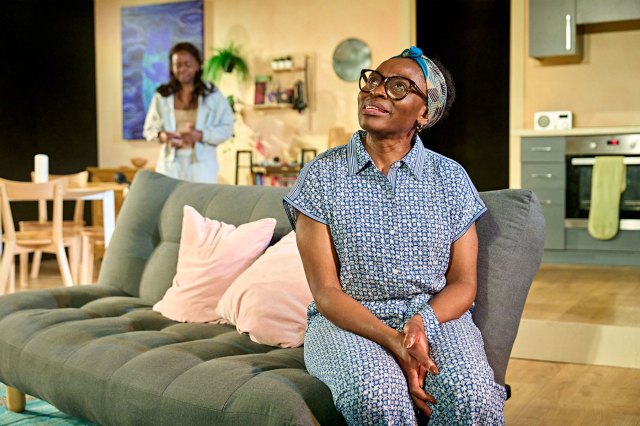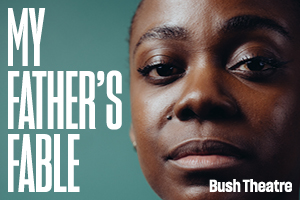My Father’s Fable at Bush Theatre – review
Olivier Award nominee Faith Omole’s play runs until 27 July

In London, disillusioned teacher Peace (Tiwa Lade) hosts her Nigerian half-brother Bolu (Theo Ogundipe) – a man she only found out existed months ago, following the death of their shared father – for dinner, and then for a two-week stay. But Peace’s mother Favour (Rakie Ayola) won’t leave the house Peace shares with boyfriend Roy (Gabriel Akuwudike), and Roy thinks they should both leave England for a bit anyway – and what exactly is it that Bolu is here to do?
It’s a compelling setup, and this confident debut from Faith Omole (recent winner of the Alfred Fagon Award, and also an actor known for We Are Lady Parts and Standing at the Sky’s Edge) very much delivers. Omole keeps the action claustrophobically confined within Peace and Roy’s kitchen, moving us through both the tense and the funny, interspersed with ghostly interruptions from Peace and Bolu’s father’s voice. Guiding us through twists and turns and moving pretty smoothly between the dramatic and the comic, My Father’s Fable is a heartfelt exploration of families, past and future.
Although siblinghood is important here, it’s the mother-daughter relationship between Peace and Favour that sits at the heart of the play. Ayola’s Favour is effortlessly manipulative towards her daughter, but clearly also loving, trying to keep her so tightly connected to her that she can barely let Peace love anyone else at all. It’s difficult to watch, as Roy and Bolu both in turn try to draw Peace out into being her own person, beyond her mother’s influence, and are rebuffed. It’s almost unbelievable that either of them would try, but Lade’s Peace is charming and lovable enough to convince us.

Through these tight character studies, Omole also explores questions about heritage, home, where we come from and what we do with it. Peace is keen throughout the play to better understand her Nigerian heritage, whether that’s from Bolu or TikTok, and Bolu himself is happy to play the role of educator to ensure that she can. The question of home and who owns it is also always in the background, through the power negotiations of sleeping arrangements in the house too small for its current inhabitants.
Making manifest the unsteadiness of Peace’s world, TK Hay’s set is beautiful and evocative – there’s a crack running through Peace and Roy’s perfectly detailed house. Although no one pays it any attention, it seems almost to be through that crack that Peace and Bolu’s father speaks from the beyond. XANA’s sound design is also gorgeous and, alongside Simisola Majekodunmi’s lighting, keeps us held like the characters with one foot always in London and the other in Nigeria.
My Father’s Fable will have you wincing, laughing and gasping out loud in equal measure, and achingly hopeful that the characters can bring themselves to be honest with each other.

















